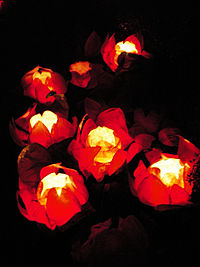 The Ghost Festival is held during the seventh month of the Chinese calendar. It also falls at the same time as a full moon, the new season, the fall harvest, the peak of Buddhist monastic asceticism, the rebirth of ancestors, and the assembly of the local community.[10] During this month, the gates of hell are opened up and ghosts are free to roam the earth where they seek food and entertainment. These ghosts are believed to be ancestors of those who forgot to pay tribute to them after they died, or those who were never given a proper ritual send-off. They have long needle-thin necks because they have not been fed by their family, or as a punishment so that they are unable to swallow. Family members offer prayers to their deceased relatives, offer food and drink and burn hell bank notes and other forms of joss paper. Joss paper items are believed to have value in the afterlife, considered to be very similar in some aspects to the material world, People burn paper houses, cars, servants and televisions to please the ghosts.[11] Families also pay tribute to other unknown wandering ghosts so that these homeless souls do not intrude on their lives and bring misfortune. A large feast is held for the ghosts on the fourteenth day of the seventh month, when people bring samples of food and place them on an offering table to please the ghosts and ward off bad luck. Lotus-shaped lanterns are lit and set afloat in rivers and out onto seas to symbolicly guide the lost souls of forgotten ancestors to the afterlife.
The Ghost Festival is held during the seventh month of the Chinese calendar. It also falls at the same time as a full moon, the new season, the fall harvest, the peak of Buddhist monastic asceticism, the rebirth of ancestors, and the assembly of the local community.[10] During this month, the gates of hell are opened up and ghosts are free to roam the earth where they seek food and entertainment. These ghosts are believed to be ancestors of those who forgot to pay tribute to them after they died, or those who were never given a proper ritual send-off. They have long needle-thin necks because they have not been fed by their family, or as a punishment so that they are unable to swallow. Family members offer prayers to their deceased relatives, offer food and drink and burn hell bank notes and other forms of joss paper. Joss paper items are believed to have value in the afterlife, considered to be very similar in some aspects to the material world, People burn paper houses, cars, servants and televisions to please the ghosts.[11] Families also pay tribute to other unknown wandering ghosts so that these homeless souls do not intrude on their lives and bring misfortune. A large feast is held for the ghosts on the fourteenth day of the seventh month, when people bring samples of food and place them on an offering table to please the ghosts and ward off bad luck. Lotus-shaped lanterns are lit and set afloat in rivers and out onto seas to symbolicly guide the lost souls of forgotten ancestors to the afterlife.
In some East Asian countries today, live performances are held and everyone is invited to attend. The first row of seats are always empty as this is where the ghosts sit. The shows are always put on at night and at high volumes as the sound is believed to attract and please the ghosts. Some shows include Chinese opera, dramas, and in some areas, even burlesque shows. Traditionally Chinese opera was the main source of entertainment but the newer shows, concerts, dramas, wars and so forth are referred to as Getai.[12] These acts are better known as "Merry-making".[13]
For rituals, Buddhists and Taoists hold ceremonies to relieve ghosts from suffering, many of them holding ceremonies in the afternoon or at night (as it is believed that the ghosts are released from hell when the sun sets). Altars are built for the deceased and priests and monks alike perform rituals for the benefit of ghosts. Monks and priests often throw rice or other small foods into the air in all directions to distribute them to the ghosts.[13]
During the evening, incense is burnt in front of the doors households. Incense stands for prosperity in Chinese culture, so families believe that there is more prosperity in burning more incense.[13] During the festival, some shops are closed as they want to leave the streets open for the ghosts. In the middle of each street stands an altar of incense with fresh fruit and sacrifices displayed on it.[13]
Fourteen days after the festival, to make sure all the hungry ghosts find their way back to hell, people float water lanterns and set them outside their houses. These lanterns are made by setting a lotus flower-shaped lantern on a paper boat. The lanterns are used to direct the ghosts back to the underworld, and when they go out, it symbolize

No comments:
Post a Comment